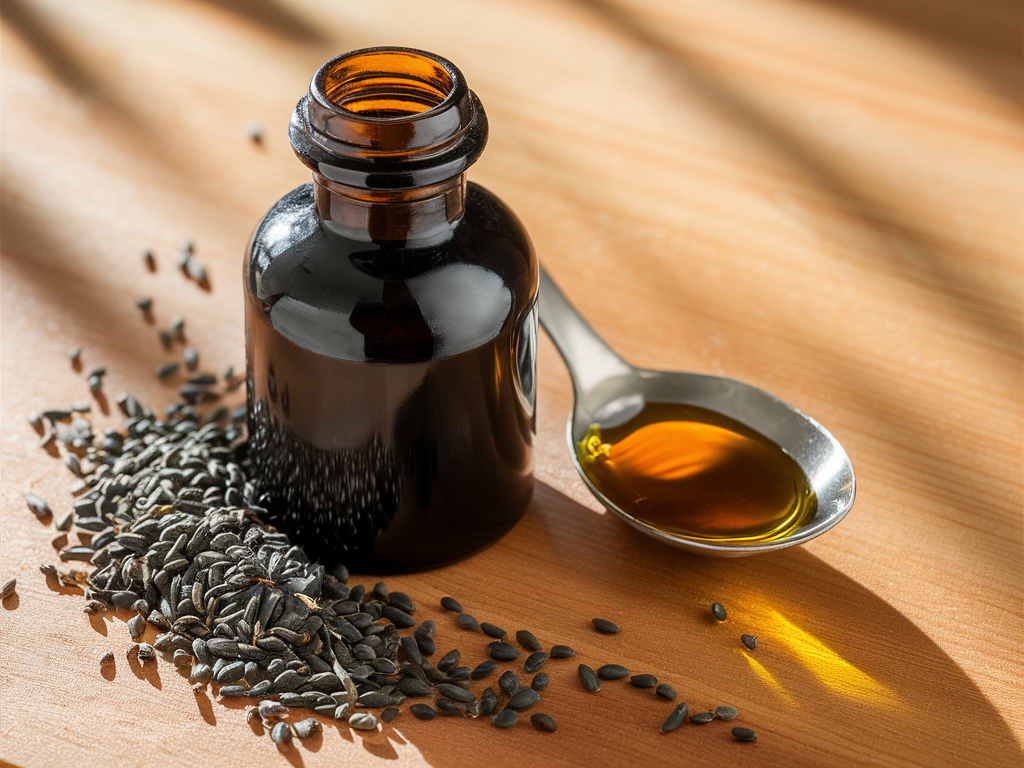Ancient remedies have experienced a renaissance in modern wellness circles, and black seed oil stands at the forefront of this movement. Derived from Nigella sativa, a flowering plant native to Southwest Asia and the Mediterranean region, black seed oil (also known as black cumin oil) has been treasured for thousands of years. From the tombs of Egyptian pharaohs to the writings of Hippocrates and Dioscorides, this “blessed seed” has been documented for its remarkable healing properties.
In recent years, the scientific community has turned its attention to this traditional remedy, conducting numerous studies to verify and understand its therapeutic potential. Modern research has revealed a complex profile of bioactive compounds, with thymoquinone emerging as the primary active constituent responsible for many of its health-promoting effects.
This article explores 10 evidence-based benefits of black seed oil that might surprise even the most dedicated health enthusiasts, bridging ancient wisdom with contemporary scientific validation.
The 10 Research-Backed Benefits of Black Seed Oil
1. Boosts Immune Function
Black seed oil has demonstrated remarkable immunomodulatory properties that can help strengthen the body’s natural defenses. Research published in the Journal of Ethnopharmacology reveals that thymoquinone, the principal bioactive compound in black seed oil, enhances the proliferation and activity of immune cells, including T-cells and natural killer cells.
Laboratory studies show that regular consumption of black seed oil can increase the ratio of helper to suppressor T-cells, optimizing immune response against pathogens. A clinical trial published in BMC Complementary Medicine and Therapies found that participants who took black seed oil supplements for four weeks showed significantly improved immune markers compared to those taking a placebo.
The antimicrobial properties of black seed oil further contribute to its immune-enhancing effects, with research demonstrating its efficacy against various bacteria, viruses, and fungi that commonly challenge the immune system.

2. Reduces Inflammation
Chronic inflammation underlies many modern diseases, from arthritis to heart disease. Black seed oil contains powerful anti-inflammatory compounds that work through multiple pathways to reduce inflammatory markers in the body.
A meta-analysis published in Phytotherapy Research examined 17 randomized controlled trials and found that black seed oil supplementation significantly reduced levels of C-reactive protein (CRP) and tumor necrosis factor-alpha (TNF-?), two key markers of inflammation.
The thymoquinone in black seed oil inhibits nuclear factor-kappa B (NF-?B) activation, a critical pathway in the inflammatory response. This mechanism explains its potential therapeutic value in inflammatory conditions such as rheumatoid arthritis, inflammatory bowel disease, and asthma.
Researchers at the University of California found that black seed oil components reduced inflammatory cytokine production by up to 70% in laboratory models of inflammation, suggesting profound anti-inflammatory capabilities.
3. Improves Respiratory Health
One of the most well-documented benefits of black seed oil relates to respiratory health. Multiple clinical studies demonstrate its efficacy in managing asthma, allergic rhinitis, and other respiratory conditions.
A randomized clinical trial published in Phytomedicine involved 80 adults with asthma who received either black seed oil or placebo for four weeks. The treatment group showed significant improvements in pulmonary function tests, including forced expiratory volume (FEV1) and peak expiratory flow (PEF), along with reduced frequency of asthma symptoms and need for rescue medication.
The bronchodilatory and anti-inflammatory properties of black seed oil make it particularly valuable for respiratory conditions. Traditional medicine practitioners have used it for centuries to treat coughs, bronchitis, and shortness of breath, with modern science now validating these applications.
Research from the International Journal of Otolaryngology found that black seed oil reduced nasal congestion and improved air flow in patients with seasonal allergic rhinitis, demonstrating its value beyond asthma management.
4. Supports Digestive Health
Black seed oil offers multiple benefits for digestive health through its effects on the gut microbiome, digestive enzymes, and mucosal protection. Studies published in Food Chemistry have shown that black seed oil possesses gastroprotective properties, preventing ulcer formation and promoting healing of existing ulcers.
Research from the World Journal of Gastroenterology indicates that black seed oil can help maintain a healthy gut microbiome by promoting beneficial bacteria while inhibiting pathogenic strains. This prebiotic effect supports optimal digestion and nutrient absorption while strengthening the gut barrier function.
Traditional medicine systems have long employed black seed oil as a carminative to reduce bloating, gas, and indigestion. Modern studies confirm its ability to enhance digestive enzyme activity and bile flow, facilitating more efficient digestion and reducing common gastrointestinal complaints.
For those with inflammatory bowel conditions, black seed oil’s anti-inflammatory properties may provide additional benefits by reducing intestinal inflammation and supporting mucosal healing.
5. Balances Blood Sugar Levels
Managing blood glucose effectively is crucial for overall health, and black seed oil shows promising effects in this area. A systematic review published in the Journal of Ethnopharmacology analyzed 7 clinical trials and found that black seed oil supplementation significantly reduced fasting blood glucose and HbA1c levels in patients with type 2 diabetes.
The mechanisms behind these effects are multifaceted. Research indicates that black seed oil improves insulin sensitivity by activating AMPK (adenosine monophosphate-activated protein kinase), a key regulator of cellular energy homeostasis. Additionally, it appears to protect pancreatic beta cells, the insulin-producing cells that are often damaged in diabetes.
A study in the Indian Journal of Physiology and Pharmacology demonstrated that black seed oil increased glucose uptake in muscle tissue while decreasing hepatic glucose production, effectively lowering blood sugar from multiple angles.
While not a replacement for conventional diabetes management, integrating black seed oil into a comprehensive approach may help optimize blood glucose control and potentially reduce the risk of diabetes-related complications.

6. Enhances Heart Health
Cardiovascular disease remains the leading cause of mortality worldwide, making heart-protective natural compounds increasingly valuable. Black seed oil has demonstrated multiple beneficial effects on cardiovascular health markers in clinical studies.
Research published in Food and Chemical Toxicology found that black seed oil supplementation for 8 weeks significantly improved lipid profiles, with notable decreases in total cholesterol, LDL (“bad”) cholesterol, and triglycerides, while increasing HDL (“good”) cholesterol levels.
Beyond cholesterol management, black seed oil has shown antihypertensive properties. A meta-analysis of 11 clinical trials published in the Journal of Hypertension concluded that black seed oil supplementation resulted in significant reductions in both systolic and diastolic blood pressure, comparable to some first-line antihypertensive medications but without adverse side effects.
The cardioprotective mechanisms of black seed oil include its antioxidant properties, which help prevent oxidative damage to blood vessels, and its ability to reduce platelet aggregation, potentially lowering the risk of dangerous blood clots. These multiple pathways of action make black seed oil a promising natural approach to supporting heart health.
7. Promotes Skin Health
The skin-enhancing properties of black seed oil make it a valuable addition to both internal and topical wellness regimens. Rich in antioxidants, essential fatty acids, and vitamins, this oil nourishes the skin while addressing various dermatological conditions.
Research published in the Journal of Dermatology and Dermatologic Surgery demonstrated that topical application of black seed oil significantly improved acne vulgaris after 2 months, with 67% of participants showing positive results. The oil’s antimicrobial and anti-inflammatory properties contribute to its efficacy against acne-causing bacteria and associated inflammation.
For individuals with eczema and psoriasis, black seed oil offers notable benefits. A clinical trial found that topical black seed oil reduced the severity of hand eczema by 60% after 4 weeks, outperforming conventional treatments in some participants. Its ability to modulate immune response in the skin while restoring barrier function makes it particularly valuable for these chronic skin conditions.
The oil’s regenerative properties also enhance wound healing and reduce scarring. Research in the International Journal of Pharmaceutical Sciences and Research found that black seed oil accelerated wound closure and promoted collagen production, essential for skin repair and regeneration. These properties, combined with its rich antioxidant content, also contribute to its anti-aging benefits, helping to minimize fine lines and maintain skin elasticity.
8. Supports Brain Function
Emerging research highlights black seed oil’s impressive neuroprotective properties and potential benefits for cognitive function. The thymoquinone in black seed oil has demonstrated the ability to cross the blood-brain barrier, directly protecting neurons from oxidative stress and inflammation.
A study published in Neurochemical Research found that black seed oil components protected brain tissue against neurotoxicity and reduced markers of neurodegeneration. This protective effect may be particularly valuable for age-related cognitive decline and neurodegenerative conditions.
Research in the Journal of Ethnopharmacology demonstrated that black seed oil improved memory and learning in laboratory models, with researchers attributing these effects to enhanced neurotransmitter function and reduced neuroinflammation. Human studies, though limited, suggest potential benefits for attention, memory, and cognitive processing speed.
Black seed oil’s ability to improve circulation and regulate blood glucose may provide additional indirect benefits for brain health, as both cerebral blood flow and glucose metabolism are crucial for optimal cognitive function. These multifaceted effects make black seed oil a promising natural approach for supporting brain health throughout life.
9. May Have Anti-Cancer Properties
While still primarily in laboratory and animal research phases, the potential anti-cancer properties of black seed oil have generated significant scientific interest. Multiple studies have demonstrated that thymoquinone, the primary active compound in black seed oil, can inhibit cancer cell proliferation and induce apoptosis (programmed cell death) in various cancer cell lines.
Research published in Molecular Cancer Therapeutics showed that thymoquinone suppressed tumor growth and increased survival rates in pancreatic cancer models by inhibiting pro-inflammatory pathways that contribute to cancer progression. Similar effects have been observed in studies of breast, colon, lung, and prostate cancer cells.
Black seed oil appears to work through multiple anti-cancer mechanisms, including DNA damage prevention, cell cycle arrest, angiogenesis inhibition, and enhancement of natural killer cell activity against cancer cells. Particularly promising is thymoquinone’s ability to selectively target cancer cells while sparing healthy cells, a crucial advantage over many conventional treatments.
While these findings are encouraging, it’s important to note that most research remains preclinical. Black seed oil should be viewed as a potential complementary approach to conventional cancer treatments rather than a standalone therapy, and any use in cancer management should be discussed with healthcare providers.

10. Alleviates Allergies
The anti-allergic potential of black seed oil provides relief for those suffering from various allergic conditions. Research published in the American Journal of Otolaryngology found that black seed oil significantly reduced symptoms of allergic rhinitis, including nasal congestion, itching, sneezing, and runny nose.
The antihistamine properties of black seed oil stem from its ability to inhibit histamine release from mast cells and reduce IgE antibody production, key drivers in allergic reactions. A randomized controlled trial involving 66 patients with allergic rhinitis showed that black seed oil capsules reduced the severity of symptoms by up to 70% compared to placebo.
Beyond seasonal allergies, black seed oil has shown promise for food and contact allergies. Research in the European Journal of Inflammation demonstrated that black seed oil components could modulate the immune response in food allergy models, reducing the severity of allergic reactions and associated inflammation.
For individuals with allergic skin conditions like hives or contact dermatitis, both oral consumption and topical application of black seed oil may provide relief by reducing inflammatory mediators and stabilizing mast cells that trigger allergic skin reactions.
How to Incorporate Black Seed Oil Safely
Recommended Dosages
Finding the optimal dosage of black seed oil depends on the form used and the specific health goals. Based on clinical studies, the following guidelines may help:
- Liquid oil: 1-2 teaspoons (5-10 ml) daily, divided into two doses. For therapeutic purposes, some studies have used up to 2 tablespoons daily, but higher doses should be approached gradually.
- Capsules: Typically 500-1500 mg daily, following manufacturer’s recommendations. Look for standardized products containing 2-5% thymoquinone for maximum benefit.
- Whole seeds: 1-2 teaspoons daily, which can be ground and added to foods. Whole seeds provide fiber and additional nutrients not found in the extracted oil.
The concentration of active compounds can vary significantly between products, so starting with lower doses and increasing gradually is advisable. For specific conditions, research suggests:
- Respiratory conditions: 1-2 g of oil daily
- Blood sugar management: 2-3 g daily
- High blood pressure: 0.5-2 g daily
- Skin conditions: Both topical application (oil directly or in creams) and internal consumption (1-2 g daily)
Methods of Consumption
Black seed oil offers versatility in how it can be incorporated into daily wellness routines:
Culinary uses:
- Drizzle over salads, hummus, or roasted vegetables
- Add to smoothies or fresh juices (1 teaspoon per serving)
- Mix into yogurt or oatmeal with honey to balance the bitter flavor
- Use in salad dressings combined with lemon juice and olive oil
- Incorporate into marinades for meats and vegetables
Topical applications:
- Apply directly to skin concerns like eczema, psoriasis, or acne (perform a patch test first)
- Mix with carrier oils like jojoba or coconut oil (1:1 ratio) for massage
- Add a few drops to your regular moisturizer or serum
- Create hair masks by combining with coconut oil for scalp health
Supplement options:
- Capsules offer a convenient, tasteless option with standardized dosing
- Soft gels typically contain pure oil in measured doses
- Liquid supplements can be taken directly or mixed with honey to mask the strong flavor
For optimal absorption, taking black seed oil with food, particularly with a source of healthy fat, may enhance bioavailability of its active compounds.
Potential Side Effects and Precautions
While generally recognized as safe for most adults, black seed oil requires certain precautions:
Known interactions with medications:
- May enhance the effects of blood-glucose-lowering medications, requiring careful monitoring and possible dosage adjustments
- Could interact with anticoagulants and antiplatelet drugs due to its mild blood-thinning properties
- Potential interactions with certain antihypertensive medications, as it may further lower blood pressure
- May affect the metabolism of medications processed by the liver cytochrome P450 pathway
Pregnancy and breastfeeding considerations:
- Not recommended during pregnancy as it may stimulate uterine contractions
- Limited safety data for breastfeeding mothers; consultation with a healthcare provider is essential
Groups who should exercise caution:
- Individuals with bleeding disorders or scheduled for surgery (discontinue at least two weeks before surgical procedures)
- Those with low blood pressure or taking blood pressure medications
- People with autoimmune conditions, as the immunomodulatory effects could potentially exacerbate symptoms in some cases
- Individuals with allergies to plants in the Ranunculaceae family (buttercup family)
Common mild side effects may include digestive discomfort, nausea, or bloating when taken orally, and skin irritation when applied topically. Starting with lower doses and performing patch tests for topical use can help minimize adverse reactions.
Conclusion
The remarkable therapeutic potential of black seed oil bridges ancient wisdom and modern science, offering a natural approach to supporting multiple aspects of health. From its powerful immune-enhancing and anti-inflammatory properties to its benefits for respiratory, digestive, and cardiovascular health, research continues to validate traditional uses while uncovering new applications.
Perhaps most impressive is the versatility of black seed oil, with benefits extending to skin health, cognitive function, blood sugar regulation, and potentially even cancer prevention. The breadth of these effects stems from its complex phytochemical profile, with thymoquinone and other bioactive compounds working synergistically through multiple physiological pathways.
As with any natural remedy, consultation with healthcare providers is essential, particularly for those with existing health conditions or taking medications. Used appropriately, black seed oil represents a valuable addition to a holistic wellness approach—one that honors traditional healing wisdom while embracing scientific validation.
In a world increasingly recognizing the limitations of single-target pharmaceutical approaches, black seed oil offers a complementary perspective: a natural, multi-faceted remedy that supports the body’s innate healing systems and promotes balance across diverse physiological functions.

